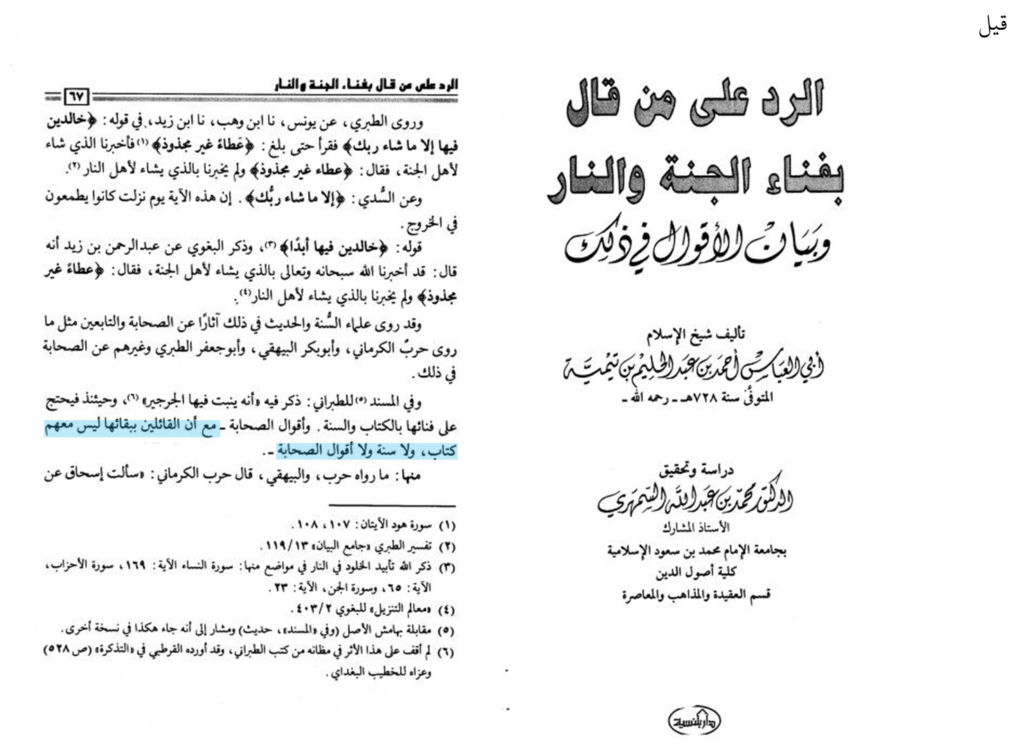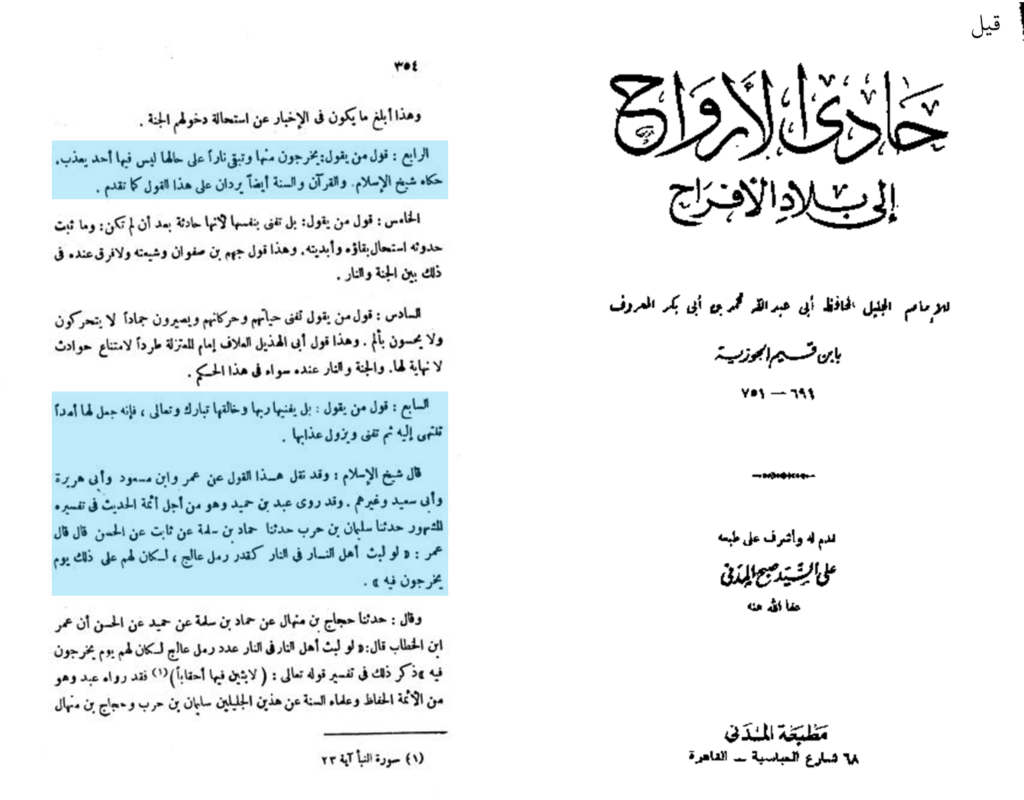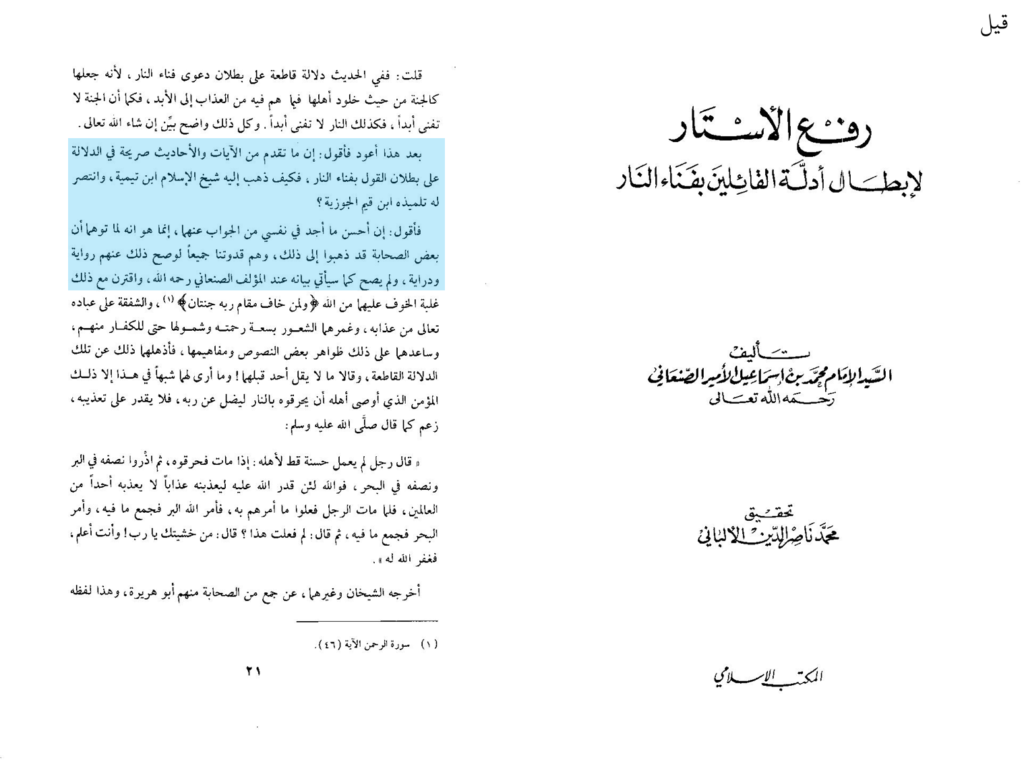Section
Ibn Taymiyah wrote a booklet “Ar-Raddu ^ala Man Qala bi-fana`il-Jannati wan-Nar (The Refutation of Whoever Says that Paradise and Hell are Finite)”. Many Wahhabiyys hide this book, meaning they do not make it readily available. He said on Page 67 [Appendix 1]:
مَعَ أَنَّ القَائِلِيْنَ بِبَقَائِهَا لَيْسَ مَعَهُمْ كِتَابٌ وَلَاسُنَّةٌ وَلَا أَقْوَالُ الصَّحَابَة
…Although those who say that it (Hell) is everlasting have no evidence from the Book, the Sunnah or the statements of the Companions.
The title has a trick in it. It seems from the title that he wants to defend the perpetuity of Paradise and Hell, by refuting those who say that they are both finite. However, if you read the contents of the book, you will see that what he REALLY meant is that ONLY Paradise is everlasting, not Hell also. He means by his title that he is NOT refuting those who specifically say that Hell is finite, because he agrees with that. He is refuting those who say that BOTH Paradise and Hell are finite. He is saying, in other words, that only Paradise is NOT finite. So he is refuting those who equate Paradise and Hell in perpetuity. However, whoever only reads the title will not understand what he meant. He claimed in this book that when Hellfire is extinguished, a plant called “Al-Jarjeer” will grow there.

PDF LINK: https://archive.org/details/FP49543/page/n66/mode/2up
Ibn Qayyim Al-Jawziyyah
Also, Ibn Qayyim confirmed that this was Ibn Taymiyah’s position in his book “Haadil-Arwaah“, and he even agreed with him.
Ibn Qayyim said in his book entitled Hadil-Arwah Page 354:
«حادي الأرواح إلى بلاد الأفراح – ط المدني» (ص354):
«الرابع قول من يقول يخرجون منها وتبقى نارا على حالها ليس فيها أحد يعذب حكاه شيخ الإسلام والقران والسنة أيضا يردان على هذا القول كما تقدم»
«حادي الأرواح إلى بلاد الأفراح – ط المدني» (ص354):
«السابع قول من يقول بل يفنيها ربها وخالقها تبارك وتعالى فانه جعل لها أمدا تنتهي إليه ثم تفنى ويزول عذابها قال شيخ الإسلام وقد نقل هذا القول عن عمر وابن مسعود وأبى هريرة وأبى سعيد وغيرهم وقد روى عبد بن حميد وهو من اجل أئمة الحديث في تفسيره المشهور حدثنا سليمان بن حرب حدثنا حماد بن سلمة عن ثابت عن الحسن قال قال عمر: لو لبث أهل النار في النار كقدر رمل عالج لكان لهم على ذلك يوم يخرجون فيه»

PDF LINK: https://archive.org/details/FP6626/6626/page/n354/mode/2up
Al-Albaniyy
Al-Albaniyy said in his book entitled “Raf^ Al-Astar” Page 21:
قلت: ففي الحديث دلالة قاطعة على بطلان دعوى فناء النار لأنه جعلها كالجنة من حيث خلود أهلها فيما هم فيه من العذاب إلى الأبد فكما أن الجنة لا تفنى أبدا فكذلك النار لا تفنى أبدا وكل ذلك واضح بين إن شاء الله تعالى. بعد هذا أعود فأقول: عن ما تقدم من الآيات والأحاديث صريحة في الدلالة على بطلان القول بفناء النار فكيف ذهب إليه شيخ الإسلام ابن تيمية وانتصر له تلميذه ابن قيم الجوزية؟ فأقول: إن أحسن ما أجد في نفسي من الجواب عنهما إنما هو أنه لما توهما أن بعض الصحابة قد ذهبوا إلى ذلك وهم قدوتنا جميعا لو صح ذلك عنهم رواية ودراية ولم يصح كما سيأتي بيانه عند المؤلف الصنعاني رَحِمَهُ اللَّهُ واقترن مع ذلك

PDF LINK: https://archive.org/details/waqraiakfn/page/n19/mode/2up
Ibn Taymiyah Contradicted Himself
Ibn Taymiyah contradicted himself because he had previously documented in his book, Minhaj As-Sunnatin-Nabawiyyah, that Paradise and Hell are both everlasting and do not perish, and that this is by the consensus of the Muslims, and that no one opposed the Muslims in that except Jahm Ibn Safwan, so the Muslims deemed him a kafir. Later, he claimed that there is no evidence that Hell is everlasting, and that any consensus about that is unknown, and he wrote an entire book on it!
